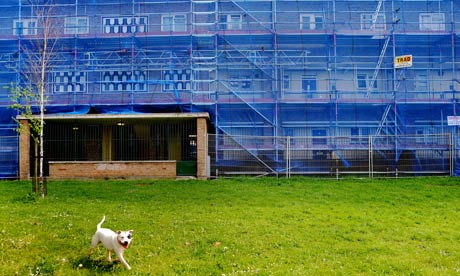W-shaped recession feared as construction sector deteriorates
• Decline accelerates after slowing in April and May
• Bank of England survey finds more credit available
- guardian.co.uk, Thursday 2 July 2009 10.57 BST
- Article history
Activity in Britain's construction sector contracted more quickly in June than in April and May despite tentative signs of economic recovery, prompting fears of a w-shaped recession.

New homes being built in London. Photograph: Sarah Lee
The Chartered Institute of Purchasing & Supply (CIPS) said that the construction PMI index dropped to 44.5 in June, moving further below the 50 mark that separates growth from contraction. The PMI stood at 45.9 in May.
David Noble, the CIPS's chief executive, said: "Against the backdrop of difficult market conditions, the UK construction sector is on a knife-edge. After the improvements seen in April and May, the sector has retracted as firms battle to consolidate their position in the tough market. This data adds to speculation of a w-shaped recession.
"With conditions worsening, particularly in the housing and commercial sub-sectors, competition between firms remained fierce and many were forced to cull jobs again."
The CIPS survey showed that construction firms continued to slash jobs in June, with many companies running redundancy programmes following reduced activity levels. They also pointed out that sub-contractors have been forced to cut their charges to compete for scarce work.
However, Noble added that the sector was in better shape than at the start of the year. "Though purchasing managers say current contracts are drying up and the new business horizon looks sparse, they are still resolute that wider economic recovery will materialise over the coming 12 months," he said.
Separately, the Bank of England said that British lenders expected to make credit more available to households and businesses over the coming months but were not expecting much pick-up in demand.
In its quarterly credit conditions survey, the Bank said lower funding costs had boosted the availability of secured credit to households in the second quarter – the first increase since the third quarter of 2007. The news will provide some comfort to the Bank's governor, Mervyn King, who has warned that economic recovery will be impossible until banks begin lending more.
"This partly reflects lending commitments made by lenders to the government as a condition for participation in the asset protection scheme," the Bank said.
"While concerns about the economic outlook had continued to bear down on credit availability, the impact had been smaller than in previous surveys."
Vicky Redwood, UK economist at the consultancy Capital Economics, said the survey was "not overly encouraging".
"Admittedly, a positive net balance of lenders expect to make more credit available over the next three months, for both mortgage and business lending. But the balances were broadly unchanged from February's survey – even though funding costs have fallen and the near-term economic outlook has improved.

No comments:
Post a Comment